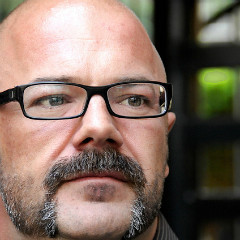
No surprise this Jesus-flavored civil religion increasingly alienates its own youth and becomes more shrill as the economy and culture deteriorate, but Sullivan’s analysis of the crisis misses on several points worth considering.
For Sullivan, the simple, pure, apolitical Jesus is the one that insists we “give up power over others, because power, if it is to be effective, ultimately requires the threat of violence. . . .”
Power is complex, and Sullivan’s simplistic approach automatically renders Jesus’ treatment of the temple moneychangers indecipherable. But focus on just one facet of power: authority. “If we return to what Jesus actually asked us to do and to be — rather than the unknowable intricacies of what we believe he was — he actually emerges more powerfully and more purely,” says Sullivan. His article’s promo copy (though Newsweek editors may be more to blame for this than Sullivan) amplifies the underlying message: “Forget the church. Follow Jesus.”
It’s a trendy thing to say, but how do we know what Jesus asks of us? Unlike Muhammad or L. Ron Hubbard, Jesus didn’t scratch out a word of Scripture. We only know what Jesus said because his followers wrote things down. These followers and their community — that is to say, the church — then curated that message. That means we have to understand Jesus’ words in a matrix that includes the thoughts and writings of the early church: its bishops, priests, poets, monks, theologians, and artists. Divorcing Jesus from the church is conceptually impossible.
This plays havoc with Sullivan’s simplistic idea of power, because we access Christ and his teachings by submitting to the authority of the church. This authority is no mere historical accretion. Despite the popular notion that the early church resembled a loose network hippies passing their Sundays at informal prayer meetings, significant and powerful church government is present in the first century. James, Jesus’ own brother and the first bishop of Jerusalem, exercised real authority. So did the Apostle John’s disciples Ignatius, bishop of Antioch, and Polycarp, bishop of Smyrna.
The reality of power and authority inevitably brings politics with it. Sullivan commends the example of Francis of Assisi as a Christian who determined to live peacefully and renounce power over others. Francis is a wonderful example of the complexity of the issue, as Sullivan himself notes, because he couldn’t escape politics. The more followers he amassed the greater his challenge.
Every monastic father before Francis faced the same problem: Anthony, Macarius, Pachomius, Benedict. People live in community, and politics is one of the tools people employ to negotiate those complex relationships.
It’s no good demonizing politics. You can (and should) point out its manifold bad uses, but there are good uses as well. Sullivan says that Christians must speak prophetically on occasions. Yes, but William Wilberforce required more than words to end the slave trade. It took laws. As necessary as nongovernment solutions are to the problem of abortion, defending the unborn ultimately requires laws as well.
Power is not evil, but evil uses power. The Christian conception of power on the other hand is service, modeled by Christ himself. The shepherd has power over the sheep. But the Good Shepherd also lays down his life for the sheep. Look to those early bishops, James, Ignatius, and Polycarp. Each was known as a tender and gracious leader of their communities. All three were martyred. All three laid down their the lives for the sheep.
Politicized Christianity does not often resemble that ethic of self-denial and self-sacrifice. Its leaders and followers seem to use power for their own perceived gain, ignoring the psalmist’s ancient warning: “Put not your trust in princes…in whom there is no salvation.”
Sullivan is exactly right that modern Christians turn to politics as if it has the answers. They grasp their wealth as if it can protect. But the renunciation that Sullivan sees in Jesus’ Sermon on the Mount and commends in Francis’ asceticism only make sense if the Resurrection is the anchor of Christian experience.
Though Sullivan confesses his belief in the Resurrection at the outset, he downplays its significance at the end, saying the true message of Christ was not in his Passion but “how he conducted himself through it all — calm, loving, accepting, radically surrendering even the basic control of his own body and telling us that this was what it means to truly transcend our world and be with God.”
That won’t do. If Christianity matters at all it is because of the Resurrection. We’re not Buddhists. Dying to self does not assume Nirvana. It assumes the Resurrection. Asceticism assumes the Resurrection. Using power of the sake of others assumes the Resurrection.
The real crisis of Christianity is that we no longer live in the reality of the Resurrection, an important thing to recognize as we stand just days from Easter.












